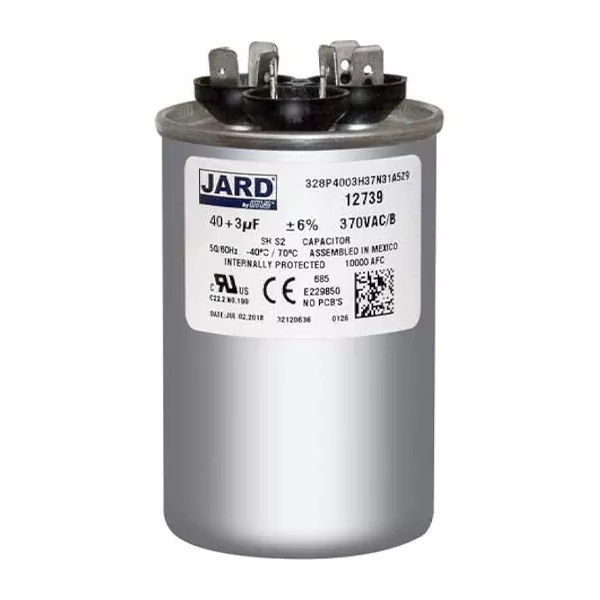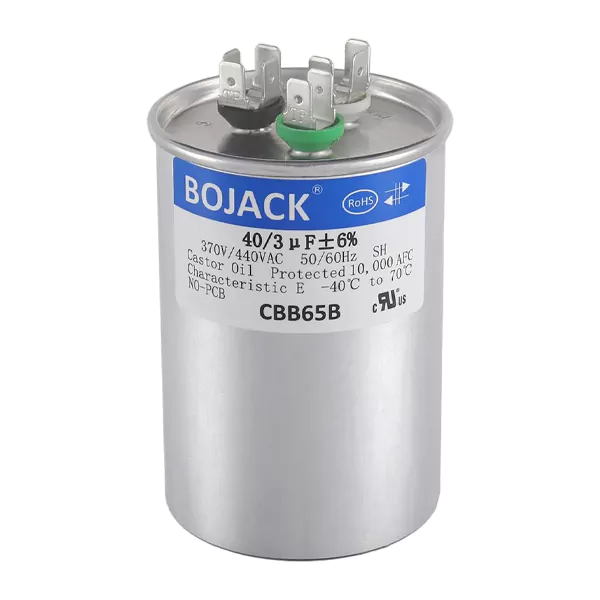40 3 Capacitor: Reliable Performance for Your Electrical Needs
The 40 3 capacitor is a crucial component in a variety of electrical systems, offering stable performance in applications that require precision and efficiency. Designed to handle both high voltage and varied loads, these capacitors are ideal for use in HVAC systems, motor runs, and other industrial applications. Available in different voltage ratings, they ensure optimal operation and longevity, making them a popular choice for manufacturers worldwide. Whether you’re seeking the 40/3 MFD or 40/3 UF capacitor, you’ll find versatile solutions to meet your needs in this category.
40 3 Capacitors With Various Voltage Ratings
40/3 capacitors come in a range of voltage ratings, ensuring they are suitable for a variety of applications. These capacitors are designed to handle voltages up to 440VAC, offering flexibility for both standard and high-power systems. With their robust design, they provide enhanced reliability and longevity, making them indispensable in commercial, industrial, and residential electrical setups.

40 3 Capacitor 370VAC
The 40/3 capacitor 370VAC is engineered to provide reliable performance in demanding electrical applications. Rated at 370VAC, it is designed for systems that require steady operation with moderate voltage. This capacitor ensures smooth operation in air conditioning units, refrigeration systems, and other HVAC equipment, where maintaining consistent performance is crucial. Its durable construction also guarantees a long lifespan, reducing the need for frequent replacements. Suitable for use in both residential and commercial settings, it is an ideal solution for various power needs.
40+3UF Capacitor 440VAC
This 40+3UF capacitor with a 440VAC rating is perfect for applications requiring higher voltage tolerance. It can effectively manage larger electrical loads in systems such as industrial air conditioners, pumps, and compressors. With its high voltage capability, this capacitor offers enhanced energy efficiency and reduces the risk of overloading in high-power circuits. Its robust construction ensures minimal heat generation and exceptional reliability in harsh working conditions. The 40+3UF Capacitor is a critical component in preventing system failures and extending equipment lifespan.


40/3UF Capacitor 370V/440VAC
The 40/3UF capacitor with a dual voltage rating of 370V/440VAC is designed for use in a wide range of applications, from residential HVAC systems to large industrial machinery. Its versatility makes it a go-to choice for electrical systems that operate in fluctuating environments. This capacitor’s ability to manage both 370VAC and 440VAC voltage ensures smooth operation even in fluctuating electrical conditions. It features high capacitance, superior durability, and effective heat dissipation, allowing it to perform reliably in high-demand situations, whether in cooling systems or motor applications.
40/3 MFD Capacitor for HVAC
Ideal for heating, ventilation, and air conditioning (HVAC) systems, this 40/3 MFD capacitor is designed to maintain energy efficiency while managing consistent performance in high-load applications. It can handle a wide range of electrical demands, ensuring systems remain stable and functional even under intense conditions. The 40/3 MFD capacitor is engineered to withstand electrical surges and temperature fluctuations, making it perfect for outdoor or industrial environments. Its long-lasting reliability and high capacitance provide exceptional value for HVAC system operators.

Applications of 40/3 Capacitor
Application 1: Air Conditioning Systems
40 3 capacitors are commonly used in air conditioning units to regulate voltage and enhance energy efficiency. With their ability to handle high voltage ratings, they ensure smooth operation of compressors and motors. By maintaining a stable electrical environment, these capacitors reduce the likelihood of system failures and improve overall performance.
Application 2: Industrial Motor Systems
In industrial motor systems, 40 3 capacitors play a critical role in maintaining stable power supply. Whether for pumps, compressors, or conveyor belts, these capacitors ensure reliable motor operation. With their high voltage ratings, they provide protection against power surges and improve the longevity of the motor by stabilizing its electrical load.
40/3 Capacitors FAQs
Related Products: 40 Capacitors | 40 5 Capacitors
Choosing the right 40/3 capacitor involves several factors including the voltage rating, capacitance value, and the specific requirements of your electrical system. First, you need to check the voltage compatibility of the capacitor with your system, ensuring that it matches or exceeds the voltage requirements. For instance, if your system operates at 440VAC, a 40+3UF capacitor with a 440VAC rating would be ideal. Also, consider the environmental conditions, such as temperature and humidity, where the capacitor will be used, as these factors can affect capacitor performance. Finally, consider the overall energy efficiency and longevity requirements of your equipment.
The lifespan of a 40/3 capacitor varies depending on usage conditions, including temperature, voltage fluctuations, and the type of system it’s used in. On average, high-quality 40/3 capacitors can last between 5 to 10 years in HVAC and motor applications. However, factors such as excessive voltage, poor system maintenance, or prolonged high temperatures can reduce their lifespan. Regular inspection and proper system maintenance are key to maximizing the lifespan of a capacitor.
The main difference lies in the capacitance value: MFD (Microfarads) is used to specify the capacitance, while UF (Microfarads) is the same unit but often used in a different context. Both are designed for similar voltage ratings but may be selected based on specific application requirements in electrical systems.
The 40/3 capacitor, with dual voltage ratings of 370V and 440VAC, is commonly used in air conditioning systems, refrigeration units, and industrial motors. Its versatility allows it to be used in various voltage environments, offering stability and enhancing the efficiency of electrical systems.